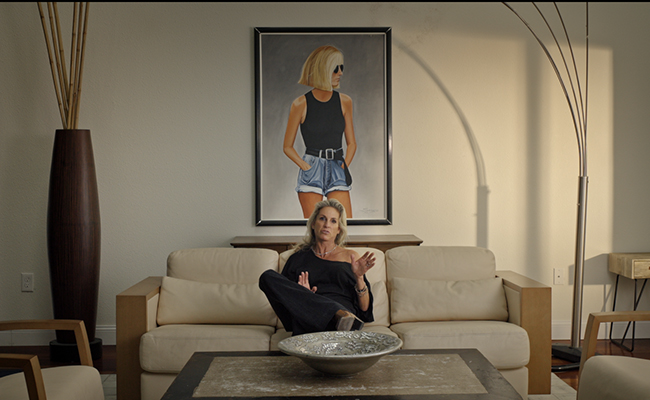With his notorious no-nonsense approach to coaching, Nick Bollettieri is regarded as a controversial figure in the world of tennis—but also, crucially, as a mentor with the know-how to push players to greatness in LOVE MEANS ZERO. Director Jason Kohn balances the pointed questions to his subject, who remains intransigent throughout, with interviews with many of Bollettieri’s students—Boris Becker and Jim Courier among them—to shed light on the enigmatic figure. What emerges is a story of a coach fiercely determined to win at all costs, and a compelling look at what it takes to compete at the highest level.
What an incredible film! I definitely learned a lot, and not just about tennis. Please describe LOVE MEANS ZERO in your own words.
Jason Kohn: From the beginning of the process, I saw Nick as a “lion in winter,” a patriarch struggling to examine the crucial decisions that defined his success (as well as their consequences). Akira Kurosawa’s RAN was the structural model I quoted from the most. In RAN (Kurosawa’s interpretation of King Lear), Kurosawa built his narrative around a series of set-piece battle sequences that each revealed a crucial piece of Lord Ichimonji’s backstory. Similarly, I used three epic tennis matches as lenses through which we view Nick’s rise through the tennis world. There were also other ways in which RAN figured prominently as a source of inspiration—from the ruins of the old Colony Hotel where we shot our main interview, to the use of three surrogate sons to tell the story (Jim Courier, Boris Becker, and Andre Agassi).
If, in the end, we were able to entice non-tennis fans to engage with this film, Kurosawa deserves a good deal of the credit.
What inspired you to make this film? Do you have a personal connection to the sport?
Jason Kohn: LOVE MEANS ZERO had humble origins. I do play tennis, and originally the film was conceived of as a 60-minute television documentary, offering a mostly straightforward look at the life of a tennis coach I remembered fondly from my childhood. When Andre Agassi refused to sit down for an interview, though, everything changed. In that moment of apparent defeat, I realized that this wasn’t solely a historical film—it also had a strong present tense storyline. Although it had been more than two decades since they parted ways, both Agassi and Bollettieri were still hurt, and the sports documentary began to evolve into a family drama.
Nick Bollettieri complained about being interviewed for 14 hours, yet he loves telling stories and reveling in his glory days. What was the hardest part about working with him to make this film?
Jason Kohn: After our first interview day, it became apparent that Nick was especially adept at crafting a narrative about his life that left little room for introspection or critique. Of course this was troubling for a film that aspired to be more than an advertisement for Nick’s private coaching lessons (at $900/hour). The strategy for my second interview day was to use argument as a method of engagement. I’m not convinced this would have worked with anyone else, but, since I grew up as a Jew in New York and Nick is very much an old-school New York Italian-American, argument was a kind of lingua franca for us.
What was the most satisfying part of making LOVE MEANS ZERO?
Jason Kohn: I saw this film as an opportunity to explore traditional narrative structure in a way that I hadn’t attempted in the past. LOVE MEANS ZERO represents my attempt to create a story as emotionally satisfying as MANDA BALA (SEND A BULLET) was intellectually provocative.
I read that Andre Agassi has yet to comment on the film; Bollettieri clearly gets choked up about their relationship. Are you interested in what Agassi would have to say?
Jason Kohn: Andre’s participation was critical to my original concept. When we learned he wouldn’t participate, I was gutted. I thought I’d lost the film. Not long after, though, I realized that his refusal to talk about Nick spoke volumes. The wounds, on both sides, were and are still raw. When I finally interviewed Nick, I saw just how hurt he was. When he lost Andre, he lost a son, and I believe that it haunts him still.
Do you have any advice for aspiring documentarians?
Jason Kohn: I think most people tend to view documentary as a separate form of storytelling, rather than a genre that co-exists within cinema next to other genres like horror, comedy or romance. My advice to aspiring documentary filmmakers would be to remember that feature-length documentaries are first and foremost movies.
What are you hoping Hamptons audiences take away from your film?
Jason Kohn: While editing the film, we kept an index card pinned on a corkboard that read: “Why do we care about Nick?” At first, we structured the film largely around the conflicts in Nick’s life—his betrayal of Jim Courier and Kathleen Horvath, the ostensible opportunism of picking up Boris Becker, the question of Nick’s breakup with Andre Agassi, etc. And, by in large, those conflicts did not expose Nick’s better side. My challenge was to contextualize those conflicts to reveal what I know to be true about Nick—he is exceedingly generous, charming and engaging (in the best possible sense). The tension between Nick’s qualities as a person and his life choices became a much larger part of this puzzle than I ever anticipated, and I hope that our audience appreciates those contradictions.
We’re excited to have the film at the Festival. What are you looking forward to most at HIFF25?
Jason Kohn: Although I currently live in Los Angeles, I’m originally from Long Island, so I’m looking forward to spending some time back on my home turf.
Catch the New York Premiere of LOVE MEANS ZERO in the Documentary Competition section of HIFF25. Find tickets.






